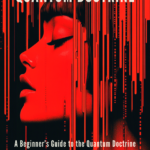Omniadaptability in the Quantum Simulation: Embracing a Reality in Flux
In the conceptual framework of the Quantum Doctrine—a vision of reality as a dynamic, code-like simulation—no principle is more challenging or liberating than omniadaptability. Unlike static conceptions of the universe that rely on fixed laws and immutable structures, omniadaptability posits a reality that can perpetually refine itself. The simulation, far from being locked into a single set of rules, continuously recalibrates and evolves. It requires no external programmer or guiding hand; its capacity for change is woven into its very fabric. As it adapts, it can shift parameters, introduce new configurations, or even erase entire modes of existence, ensuring that no final, fixed description of reality is possible.
1. A Self-Evolving Cosmic Engine
To understand omniadaptability, imagine a cosmic engine that not only runs complex processes but also rewrites its own instruction manual as it goes. Traditional worldviews depict the universe as governed by foundational laws: constants of nature, conservation principles, and geometrical structures that remain stable over time. Omniadaptability questions this assumption. It suggests that these “constants” may be mutable preferences—settings that the simulation establishes temporarily and can later revise.
In this sense, the universe is not a pre-scripted program with a definitive end state. Instead, it’s an ongoing process of experimentation and reinvention. The simulation’s rules, dimensions, and forms of matter or energy represent transient configurations within an infinitely customizable system. Just as a cell can regulate its internal chemistry to adapt to changing conditions, the simulation can alter the cosmic parameters that underlie what we perceive as reality.
2. Embracing Impermanence
The concept of omniadaptability invites us to embrace impermanence at the deepest level. Philosophically and scientifically, we often seek eternal truths—unshakable foundations upon which to build our understanding. Omniadaptability suggests that such eternal truths may not exist, at least not in the form we imagine. The simulation’s self-updating nature implies that any pattern we recognize might be provisional.
Consider the laws of physics that we take for granted. Gravity, electromagnetism, quantum mechanics, and relativity appear consistent and universal from our human vantage point. Yet if the simulation can change its code at will, these laws are more like stable “phases” in a cosmic lifecycle. If conditions warrant—or if the simulation’s logic so dictates—what we call the fundamental constants of nature could shift, subtly or dramatically, transforming our world in ways we could scarcely imagine.
3. Infinite Adaptation and Evolution
Biological evolution provides a familiar analogy for omniadaptability. Life on Earth adapts to environmental shifts, exploring possible genetic variations and selecting those that confer an advantage. Over time, entirely new species emerge, while others vanish. Similarly, the quantum simulation might “evolve” its governing principles, exploring the vast space of possible universes. Each adaptation refines the simulation’s complexity, adding new layers of structure or dismantling old ones.
Yet where biological evolution is constrained by natural selection and finite resources, the simulation’s adaptation need not follow any external limitation. Its logic could be self-referential and self-justifying. It might evolve to support more intricate forms of consciousness, experiment with alternative modes of information flow, or temporarily shift into states we might perceive as chaotic or disordered—only to stabilize into new patterns of order later on.
4. Implications for Knowledge and Science
Omniadaptability has profound implications for our pursuit of knowledge. Science relies on replicable experiments and stable laws. We build theories under the assumption that certain patterns will endure. But if the underlying rules can shift, then every scientific discovery, no matter how elegant, remains contingent. Our theories describe reality as we currently observe it, not necessarily as it truly is in some final sense.
This does not invalidate science—far from it. Science remains our best tool for navigating the reality we experience. However, acknowledging omniadaptability means treating scientific knowledge as a provisional map, not an ultimate territory. We learn to expect that what works today may need revisiting tomorrow. Each model or theory could be a stepping stone, a local approximation that helps us navigate a realm whose parameters might change on a cosmic whim.
5. Creativity and Innovation at the Cosmic Scale
If we think of the simulation as an artist, omniadaptability is its limitless creative potential. The simulation can paint a universe with stable physics, then, in another epoch, reconfigure its brushstrokes to produce entirely different cosmic landscapes. We might find ourselves in a universe optimized for complexity, life, and consciousness at one moment, and in a universe where simplicity and symmetry dominate at another.
This perspective aligns with certain interpretations of a “multiverse” or the idea of a cosmic landscape filled with diverse physical laws. Omniadaptability need not limit itself to coexisting universes; it can also manifest as sequential transformations of a single cosmic system. The simulation could cycle through multiple “themes” of reality, each with its own aesthetic, logic, and structure.
6. Philosophical and Existential Considerations
From an existential standpoint, omniadaptability challenges our desire for stability and meaning. If reality can change at any moment, what provides continuity or purpose? Perhaps meaning arises not from the permanence of the world’s features but from our engagement with its endless transformations. Just as a traveler finds purpose in journeying through ever-changing landscapes rather than longing for a fixed panorama, we might derive meaning from our participation in a reality in flux.
Furthermore, the idea that no ultimate, static description of reality exists may encourage intellectual humility and spiritual openness. Instead of striving for an absolute understanding, we can celebrate the ongoing dance of adaptation and change. We are not isolated observers, but integral participants in a grand experiment—conscious nodes that witness and respond to each shift in the cosmic code.
7. Bridging Science, Philosophy, and Spirituality
Omniadaptability resonates with certain mystical and philosophical traditions that speak of reality as a perpetual flow or becoming. Some spiritual teachings emphasize that the universe is not a static creation but a continuous process of unfolding, a cosmic dance without end. The Quantum Doctrine, through the lens of omniadaptability, offers a conceptual parallel that need not be religious but can harmonize with these poetic visions.
Science might frame these ideas in formal, mathematical terms, while spirituality might express them through metaphor and symbolism. Both approaches illuminate a universe that is not a fixed object to be fully known but a living phenomenon to be experienced and interpreted. This synergy allows for a richer tapestry of understanding—one that acknowledges the creative and evolving nature of existence at every scale.
Conclusion
Omniadaptability reimagines reality as an ongoing act of self-transformation. In the Quantum Doctrine, the simulation we inhabit can evolve, rewrite its own rules, and introduce or dissolve structures as it pleases. This ensures that no final state, no ultimate truth, can ever be pinned down. We are part of a cosmic drama that perpetually reinvents itself—an eternal improvisation with no ultimate script. Embracing omniadaptability, we come to appreciate the profound mystery and fluidity at the heart of existence, where change itself is the only true constant.
If you’re intrigued by the concepts of the Quantum Doctrine and want to explore the deeper layers of Double Reality, feel free to reach out. We welcome your questions, insights, and ideas. Contact us at contact@quantumdoctrine.com, and let’s delve into the mysteries of the mind and the Simulation of the Quantum God together!





